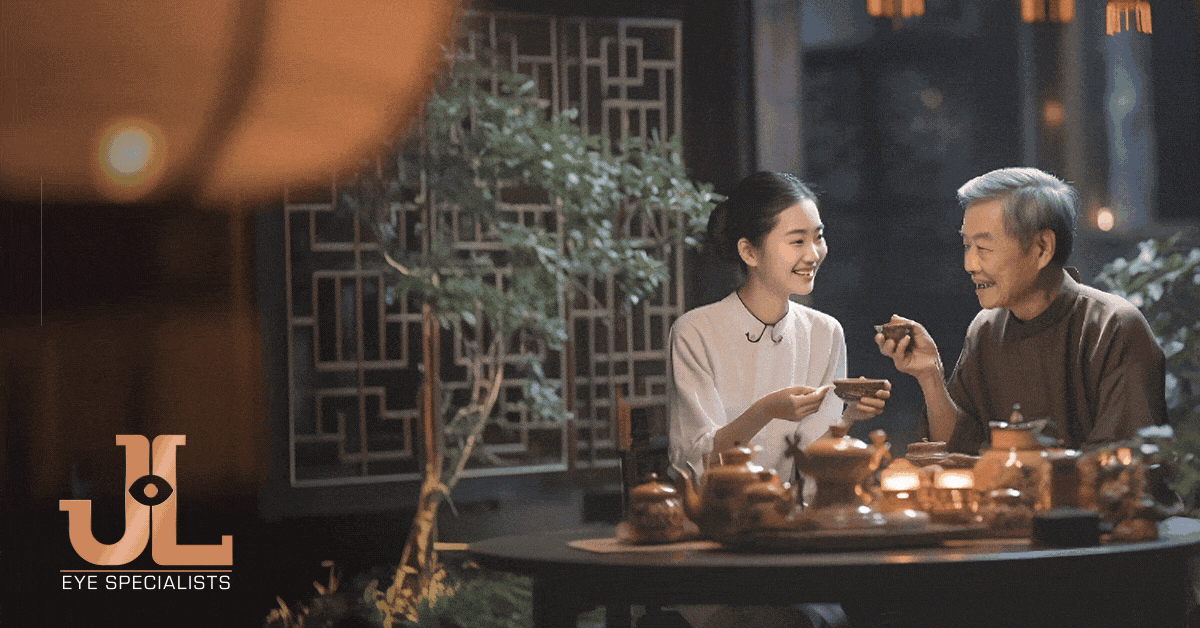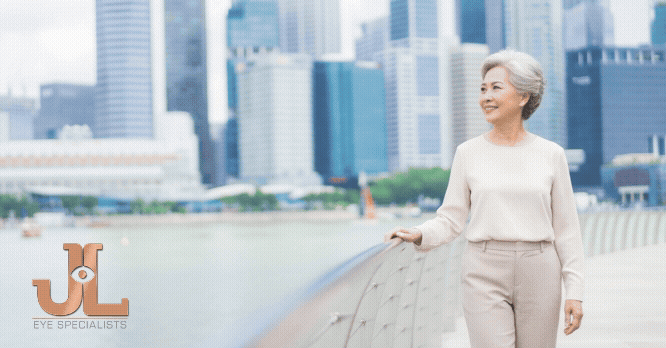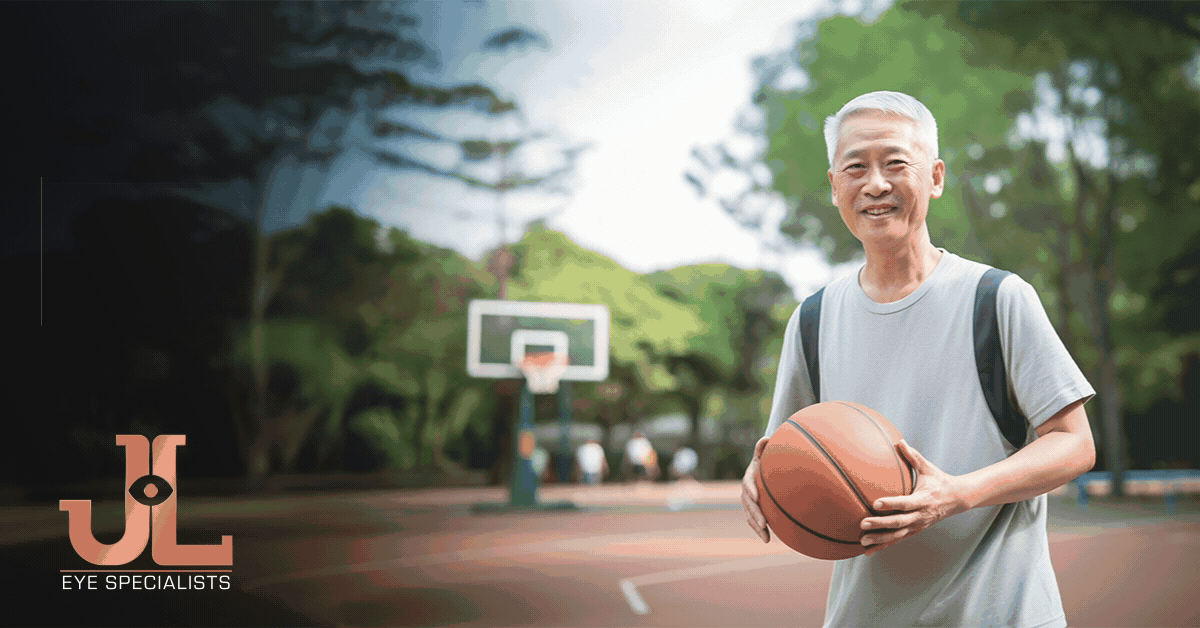LIFE AFTER CATARACT SURGERY: How Will My Vision Change?
Has the world around you started to seem a little dimmer, colours less vibrant, or familiar faces harder to recognise from a distance? This gradual change is a common sign of cataracts. If you’re considering cataract surgery, the main question on your mind is likely: “How will my vision actually change for the better?”
With this blog, we’d like to help you explore the positive visual improvements and lifestyle enhancements that individuals often report after the procedure. While every person’s journey and results are unique, understanding these common experiences can offer valuable insight. Of course, a thorough discussion with your ophthalmologist is essential to understand what you might expect in your specific situation.
Meet our Medical Director: Dr Lim Wei Kheong Jimmy
MBBS, MMed (Ophth), MRCSEd (Ophth), FRCSEd (Ophth), FAMS
A New World of Clarity and Colour
One of the most significant changes often reported by individuals after cataract surgery is a dramatic improvement in the sharpness and vibrancy of their vision. It is akin to a veil being lifted, revealing the world in its true detail and colour.
- Enhanced Visual Acuity: Everyday tasks that may have become challenging due to blurry vision often become noticeably easier. Reading small print, such as on medication packaging or in books, recognising faces from a distance, or following subtitles on television can become clearer. Many individuals describe a renewed ability to appreciate fine details in their surroundings, from the texture of a piece of fabric to the intricate patterns in nature. For example, an individual who previously struggled to see street signs clearly might find driving less stressful.
- Vibrant Colour Perception: Cataracts can cause colours to appear faded or to have a yellowish or brownish tinge. After surgery, colours are often perceived as brighter, more vivid, and truer. Whites may appear crisper, blues more intense, and the entire spectrum richer. This restoration of natural colour can be a particularly joyful aspect of recovery, allowing people to see the world with renewed appreciation. Imagine an artist who had seen their palette muted by cataracts, suddenly able to perceive the true vibrancy of their paints again.
- Reduction in Glare and Halos: A common complaint from those with cataracts is experiencing significant glare from oncoming headlights when driving at night, or halos around bright lights. This can make activities like night driving difficult or even unsafe. Cataract surgery can substantially reduce these symptoms for many, leading to greater comfort in various lighting conditions and potentially restoring confidence in night-time mobility.
Impact on Daily Life and Independence
The improvements in vision following cataract surgery often translate directly into a more active, independent, and enjoyable lifestyle.
- Greater Ease with Daily Activities: Tasks that rely heavily on good vision, such as cooking, managing personal finances, using a computer or smartphone, and personal grooming, can be performed with greater ease and safety. This can lead to a significant boost in self-confidence and a reduced reliance on others for assistance. Consider the relief an elderly person might feel being able to confidently navigate their home and prepare their meals without the constant worry of misjudging things due to poor vision.
- Renewed Enjoyment of Hobbies and Leisure: Many hobbies and leisure activities are vision-dependent. Whether it’s reading, sewing, knitting, painting, gardening, birdwatching, or playing sports like golf, clearer vision can allow individuals to re-engage with pastimes they may have had to curtail or abandon. The ability to once again immerse oneself in enjoyable activities contributes significantly to overall well-being. For instance, a grandparent might cherish the ability to clearly see their grandchildren’s faces and share activities like reading or board games with them.
- Improved Safety and Mobility: Clearer vision, improved depth perception, and reduced glare contribute to enhanced safety, both at home and when out and about. The risk of trips and falls, a significant concern particularly for older adults, may be reduced. Navigating stairs, kerbs, and unfamiliar environments can become less daunting, promoting greater mobility and independence.
- Potential for Reduced Dependence on Spectacles, or No Glasses At All! Depending on the type of intraocular lens (IOL) implanted during surgery and an individual’s specific vision needs, there may be a reduced need for spectacles for certain activities. Some IOLs are designed to correct pre-existing refractive errors such as nearsightedness (myopia), farsightedness (hyperopia), or astigmatism. While some individuals may still require glasses for specific tasks like reading fine print, many experience greater freedom from corrective lenses for general activities. This is a key point to discuss with your ophthalmologist, as IOL selection is tailored to individual requirements and lifestyle preferences.
The Journey to Clearer Vision: What to Anticipate
While improvements can be noticeable, it is a process. Understanding what to expect can help ensure a smooth transition.
- Adjustment Period: Vision typically starts to improve within a few days of surgery, but it can take several weeks for it to fully stabilise and for the eye to heal completely. It is normal to experience some initial blurriness, light sensitivity, or mild discomfort during this period.
- Importance of Follow-Up Care: Adhering to the post-operative care instructions provided by your surgeon is crucial for a smooth recovery and optimal outcome. This includes using prescribed eye drops, protecting the eye, and attending all scheduled follow-up appointments. These appointments enable your ophthalmologist to monitor your healing progress and address any concerns.
- Realistic Expectations: The goal of cataract surgery is to restore vision by removing the clouded lens. While the vast majority of patients experience a significant improvement in their vision, the outcome can be influenced by the overall health of the eye and the presence of any other pre-existing eye conditions. Discussing your expectations with your surgeon beforehand will help you understand the potential benefits in your specific case.
Beyond Better Vision: Emotional & Psychological Benefits
The impact of restored vision often extends beyond the physical. The ability to see clearly can have a profound positive effect on an individual’s emotional and psychological well-being.
- Increased Confidence and Reduced Frustration: Struggling with declining vision can be frustrating and can erode confidence. Regaining clearer sight often brings with it a renewed sense of capability and independence.
- Enhanced Social Engagement: When vision is poor, participating in social activities can become challenging, potentially leading to feelings of isolation. A clearer vision can make it easier to engage with others, recognise faces, and participate more fully in social gatherings and community activities.
- A More Positive Outlook: The overall improvement in quality of life, the ability to pursue interests, and the increased ease in performing daily tasks can contribute to a more positive outlook and greater overall happiness.
Accessing Cataract Surgery in Singapore
Typically, the clinic or hospital where your surgery is performed will assist with the claims process for MediSave and Integrated Shield Plans. We recommend discussing the estimated costs and insurance claim procedures with the clinic’s financial advisor before surgery.
- MediSave: Singapore citizens and Permanent Residents may be able to use their MediSave accounts, or those of their immediate family members (subject to prevailing withdrawal limits and conditions as stipulated by the Ministry of Health), to help cover the costs of cataract surgery.
- Integrated Shield Plans (IPs): Many individuals have IPs that provide additional coverage on top of MediShield Life. The extent of coverage for cataract surgery can vary depending on the specific plan and policy terms. It is advisable to check with your insurer regarding your coverage, any applicable co-payments or deductibles, and whether the chosen healthcare provider is on their panel.
- MediShield Life: This is a basic health insurance plan that provides universal coverage to all Singaporean Citizens and Permanent Residents. It includes provisions for cataract surgery, though claim limits apply, and it may not cover the full cost, particularly for procedures in private hospitals or with certain lens choices. Integrated Shield Plans frequently incorporate the MediShield Life portion into their coverage.
Taking the Next Step
Life after cataract surgery can, for many, mean a return to a more vibrant, active, and independent way of living. The improvements in vision can be transformative, allowing people to reconnect with the world around them in greater detail and with renewed confidence.
If you are experiencing symptoms of cataracts, such as cloudy or blurry vision, increased difficulty with glare, or changes in colour perception, and are wondering how cataract surgery might change your vision, the first step is to seek professional advice.
Schedule a comprehensive eye examination with JL Eye Specialists to discuss your symptoms, undergo a thorough assessment, and determine the most appropriate course of action for your individual needs. Please reach out to us at (65) 6258 8966 or WhatsApp us at (65) 8163 2807.
Related Post:
More Topics to Explore:
Relevant Services:
Our Doctor

DR. JIMMY LIM
Dr. Jimmy Lim is a top ophthalmologist for cataract eye surgery in Singapore, offering over 20 years of expertise in cataract treatment and management.
Gleneagles Medical Centre
6 Napier Road #07-10,
Singapore 258499
Phone: +65 6258 8966
Fax: +65 6258 8766

JL Eye Specialists is an ophthalmology clinic in Singapore that specialises in general ophthalmology, cornea, refractive (LASIK), and cataract surgery.
To cover the expenses that you may incur, we accept several corporate and international insurance policies. If you have any of the insurance plans at this side, please let us know when you schedule an appointment with us. For more questions, feel free to contact us at +65 6258 8966.





